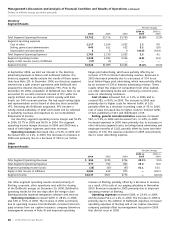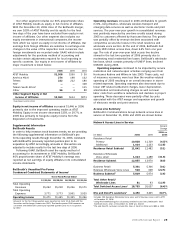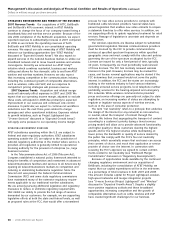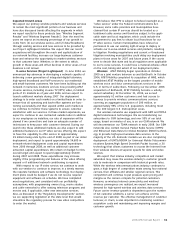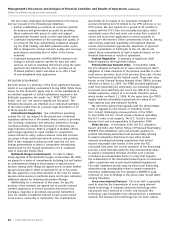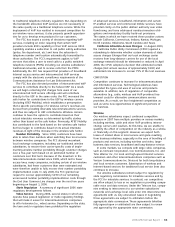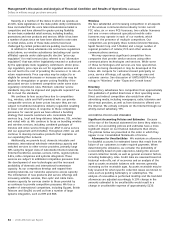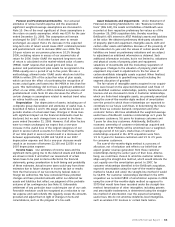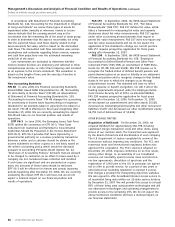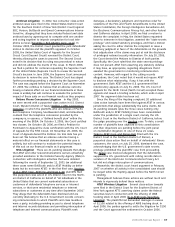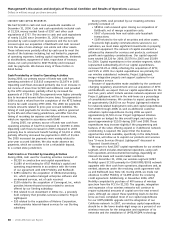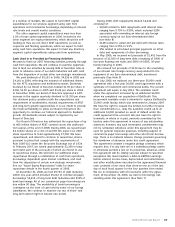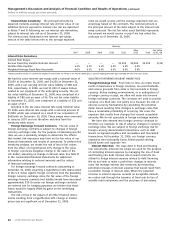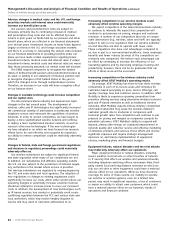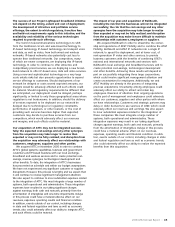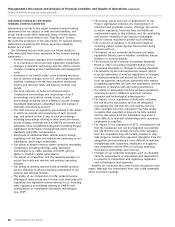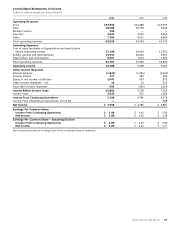AT&T Wireless 2006 Annual Report Download - page 39
Download and view the complete annual report
Please find page 39 of the 2006 AT&T Wireless annual report below. You can navigate through the pages in the report by either clicking on the pages listed below, or by using the keyword search tool below to find specific information within the annual report.
2006 AT&T Annual Report : :
37
Antitrust Litigation In 2002, two consumer class-action
antitrust cases were filed in the United States District Court
for the Southern District of New York (District Court) against
SBC, Verizon, BellSouth and Qwest Communications Interna-
tional Inc. alleging that they have violated federal and state
antitrust laws by agreeing not to compete with one another
and acting together to impede competition for local tele-
phone services (Twombly v. Bell Atlantic Corp., et al.). In
October 2003, the District Court granted the joint defendants’
motion to dismiss and the plaintiffs appealed. In October
2005, the United States Court of Appeals for the Second
Circuit Court (Second Circuit) reversed the District Court,
thereby allowing the cases to proceed. The Second Circuit
noted in its decision that its ruling was procedural in nature
and did not address the merits of the cases. In March 2006,
we filed a petition for certiorari requesting the Supreme Court
of the United States (Supreme Court) to review the Second
Circuit’s decision. In June 2006, the Supreme Court announced
its decision to review the case. The District Court has stayed
further proceedings pending a decision by the Supreme Court.
The case was argued before the Supreme Court on November
27, 2006. We continue to believe that an adverse outcome
having a material effect on our financial statements in these
cases is unlikely but will continue to evaluate the potential
impact of these suits on our financial results as they progress.
Retiree Phone Concession Litigation In May 2005,
we were served with a purported class action in U.S. District
Court, Western District of Texas (Stoffels v. SBC Communica-
tions Inc.), in which the plaintiffs, who are retirees of Pacific
Bell Telephone Company, Southwestern Bell, and Ameritech,
contend that the telephone concession provided by the
company is, in essence, a “defined benefit plan” within the
meaning of the ERISA. On October 3, 2006, the Court certified
two classes. On October 18, 2006, we filed a Petition for
Permission to Appeal the class certification with the U.S. Court
of Appeals for the Fifth Circuit. On November 20, 2006, the
Court of Appeals denied the Petition. No trial date has yet
been set. We believe that an adverse outcome having a
material effect on our financial statements in this case is
unlikely, but will continue to evaluate the potential impact
of this suit on our financial results as it progresses.
NSA Litigation There are 21 pending lawsuits that allege
that AT&T and other telecommunications carriers unlawfully
provided assistance to the National Security Agency (NSA) in
connection with intelligence activities that were initiated
following the events of September 11, 2001 (an additional
three cases name BellSouth and/or AT&T Mobility as defen-
dants but do not name AT&T). In the first filed case, Hepting
et al v. AT&T Corp., AT&T Inc. and Does 1-20, plaintiffs filed
this purported class action in U.S. District Court in the North-
ern District of California on behalf of “all individuals in the
United States that are current residential subscribers or
customers of defendants’ telephone services or Internet
services, or that were residential telephone or Internet
subscribers or customers at any time after September 2001.”
They allege that the defendants have disclosed and are
currently disclosing to the U.S. Government records concern-
ing communications to which Plaintiffs and class members
were a party, including providing access to stored telephone
and Internet records databases and permitting interception of
telephone and Internet communications. Plaintiffs seek
damages, a declaratory judgment, and injunctive relief for
violations of the First and Fourth Amendments to the United
States Constitution, the Foreign Intelligence Surveillance Act,
the Electronic Communications Privacy Act, and other federal
and California statutes. In April 2006, we filed a motion to
dismiss the complaint. In May, the United States requested
leave to intervene in this litigation, asserted the “state secrets
privilege” and related statutory privileges, and filed a motion
asking the court to either dismiss the complaint or issue a
summary judgment in favor of the defendants on the grounds
that adjudication of the claims may put at risk the disclosure
of privileged national security information. On July 20, 2006,
the Court denied the Motions to Dismiss of both parties.
Specifically, the Court ruled that the state secrets privilege
does not prevent AT&T from asserting any statutory defense
it may have, as appropriate, regarding allegations that it
assisted the government in monitoring communication
content. However, with regard to the calling records
allegations, the Court noted that it would not require AT&T
to disclose what relationship, if any, it has with the
government. Both AT&T and the U.S. government filed
interlocutory appeals on July 31, 2006. The U.S. Court of
Appeals for the Ninth Circuit (Ninth Circuit) accepted these
appeals and issued a briefing schedule, which ends in April
2007. No argument date has been set.
Since the filing of the Hepting complaint, 20 additional
class action lawsuits have been filed against AT&T in various
jurisdictions that allege substantially the same claims. All
21 pending lawsuits (plus the three cases naming only
BellSouth and/or AT&T Mobility) have been consolidated
under the jurisdiction of a single court, namely the U.S.
District Court in the Northern District of California, before
the judge presiding over the Hepting case. To date, a small
number of plaintiffs have objected to this consolidation
and their objections are pending before the joint panel
on multidistrict litigation. In one of these 21 cases,
Terkel v. AT&T Corp. and Illinois Bell (filed with the U.S.
District Court in the Northern District of Illinois), a
purported class action filed on behalf of defendants’ Illinois
customers, the court, on July 25, 2006, dismissed the case,
acknowledging that the U.S. government’s state secrets
privilege prohibited the plaintiffs’ case from proceeding.
The Terkel case involved allegations that the defendants
supplied the U.S. government with calling records data in
violation of the Electronic Communications Privacy Act
but did not allege interception of communications.
Meanwhile, the district court heard argument in February
2007 on whether all activity in the consolidated case should
be stayed while the Hepting appeal before the Ninth Circuit
is pending.
Management believes these actions are without merit and
intends to vigorously defend these matters.
AT&T Wireless Litigation Several class-action lawsuits
were filed in the District Court for the Southern District of
New York against ATTC asserting claims under the federal
securities laws in connection with the offering of AWE
tracking stock in April 2000 (In re AT&T Corp. Securities
Litigation). The plaintiffs had demanded damages in excess
of $2,100 related to the offering of AWE tracking stock. In
April 2006, the parties agreed to settle the litigation for $150
and the Court approved the settlement in October 2006.



